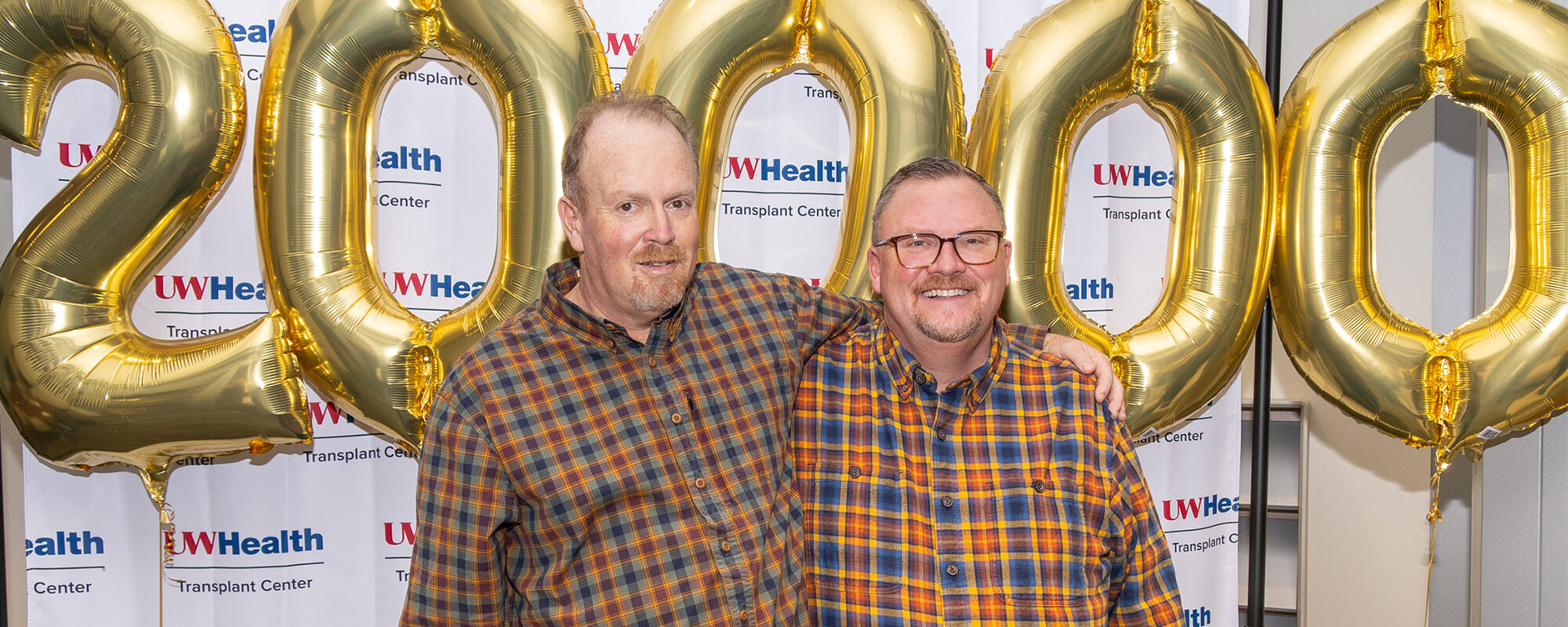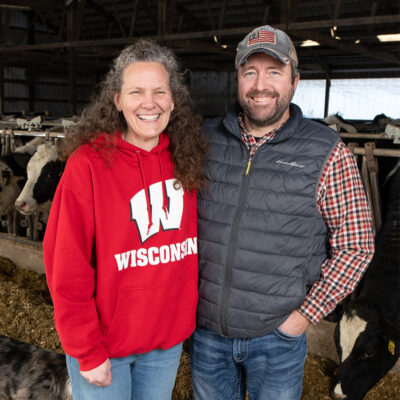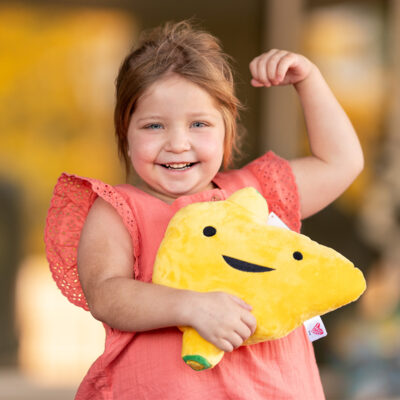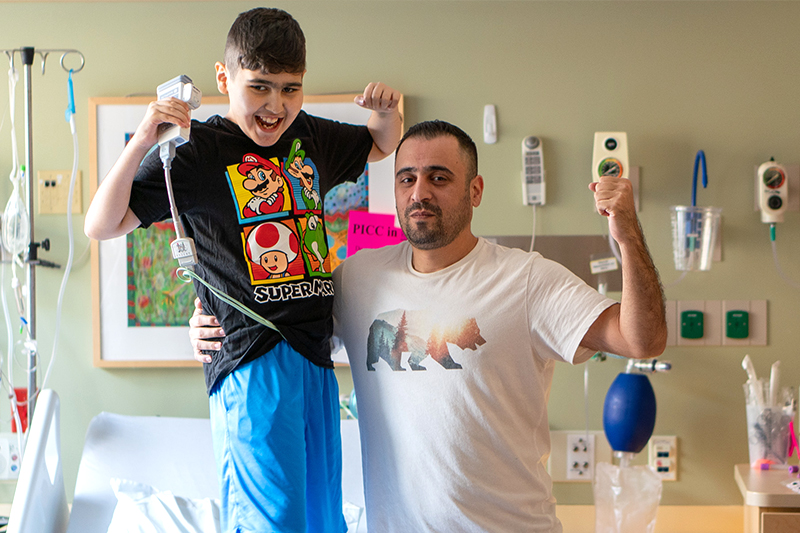Wisconsin Partnership Program Turns 20
Being the sole doctor in a physician-shortage, resource-limited area of central Wisconsin would not be everyone’s cup of tea, but for Jenna Sebranek, MD ’13, it’s a dream come true.

More than 55 years after surgeons performed the first kidney transplant at University of Wisconsin Hospital and Clinics (now University Hospital) in 1966, the UW Health Transplant Center became the first and only transplant program in the Midwest to surpass 20,000 transplanted organs, according to Dixon Kaufman, MD, PhD, FACS, medical director of the center.
“We are incredibly proud that our team’s expertise has transformed the lives of thousands of people,” said Kaufman, the Ray D. Owen Professor in the Division of Transplantation within the Department of Surgery.
Gary Grosklaus, who received the 20,000th organ during his kidney-pancreas transplant in February 2024, had been managing Type 2 diabetes for more than 15 years. The Wisconsin Rapids, Wisconsin, native was surprised to learn he was a “milestone” patient.
“I want to thank everyone who cared for me and share my gratitude for my donor,” said Grosklaus. “Together, they saved my life.”
Kaufman commented, “Our program consistently ranks as a national leader in simultaneous kidney-pancreas transplants, making this milestone a full-circle moment.”
“Patients have traveled to Madison from all 50 states and several countries to receive the gift of life,” said David Foley, MD (PG ’03), a professor and the Folkert O. Belzer Chair of the Division of Transplantation in the Department of Surgery. “Our rich history, focus on patient and family care, and unending desire to lead in research and innovation prove that our success is built on a strong framework.”

Transplantation is one of the fastest growing fields of medicine. Just 70 years ago, two physicians in Boston performed the first successful transplant when a brother donated a kidney to his identical twin. Over the following decades, medical centers across the nation began exploring how they could build transplant programs. University Hospital was among the first few programs when William Kisken, MD (PG ’63); Fritz Bach, MD; and Richard Rieselbach, MD, launched a kidney transplant program for adults in 1966. A year later, the program performed its first pediatric kidney transplant on a 14-year-old patient, who continues to thrive and marvel at the miracle that saved her life.
Work to establish a broader offering of transplants at UW Health was led by Folkert O. Belzer, MD, former chair of the Department of Surgery, who was recruited in 1974 and tasked with creating a world-class transplant program. He built a talented team — including Hans Sollinger, MD, PhD, FACS (PG ’80); Munci Kalayoglu, MD; John Pirsch, MD (PG ’85); Anthony D’Alessandro, MD (PG ’89); and Robert Love, MD (PG ’91) — to provide comprehensive care in kidney, pancreas, liver, and lung transplantation, and expand research activities.
Belzer was known internationally for developing the first kidney perfusion preservation machine. He brought in biochemist James Southard, PhD, and in 1984 they created a synthetic solution to preserve kidneys. By 1986, they expanded and improved the solution for use in livers and pancreata. Patented and marketed with the help of the Wisconsin Alumni Research Foundation, the “UW Solution” became the gold standard for kidney preservation. The UW Transplant Program, which evolved into today’s array of programs and services, established a legacy as one of the foremost organ-preservation-research laboratories in the world.
Fast forward to November 2022, when Kaufman performed UW Health’s 12,000th kidney transplant, placing the program among a handful in the United States to reach that milestone. A few months later, the team celebrated the 4,000th living donor.
“Those were remarkable early years when UW physicians were continuously achieving transplant ‘firsts’ by inventing techniques and medications to improve outcomes,” said Kaufman. “The passion of those who built these programs continues today, allowing us to transplant more organs and reach new milestones.”

As the transplant program continued to enhance its national reputation, collaboration with various departments proved successful. Growth in transplant activity and organ donations; improvements in outcomes, quality, and regulatory compliance; and expansion of a partnership with the UW Health Human Leukocyte Antigen (HLA) Laboratory provided integrated delivery of high-quality, patient-centered care. Expanding on this model in 2020, leaders created the UW Health Transplant Center to administratively align care across the health system. Kaufman became the medical director, and Melissa Roberts, RN, MSN, became the senior director.
The center model unifies the efforts of 12 transplant programs at UW Health that serve adults and pediatric patients, and the HLA Laboratory, which works to ensure histocompatibility. The UW Health Transplant Center works closely with UW Organ and Tissue Donation, a highly successful recovery program.
As the UW Health Transplant Center grew, so did its need for clinical space. In 2022, the center opened the Pleasant T. Rowland Transplant Clinic, made possible through the generosity of its namesake, a local educator, entrepreneur, philanthropist, and recipient of a kidney from a living donor.
The 16,000-square-foot clinic is designed to serve the needs of living organ donors and adult transplant patients. Using state-of-the-art technology and special touches, patients are supported throughout their journey. Displays honor living donors of kidneys and/or a portion of their livers.
“Conceptualizing, building, and opening the new clinic was a highlight of many of our careers,” said Roberts. “We want this journey to be comfortable and easy to navigate for patients, families, and staff members.”
Digital systems allow staff members to monitor patients as they progress through their appointments, track lab work, and assist with safe medication administration.
“We’ve seen a 32 percent growth in patient visit volume since the Pleasant T. Rowland Transplant Clinic opened,” said Roberts. “We are thrilled to be able to provide more access to patients seeking organ transplant and living donation options.”
Calling on special services at American Family Children’s Hospital (AFCH), the UW Health Transplant Center built on its 55-year history of serving children in need of transplants by launching the Kids Heart Transplant and Ventricular Assist Device (VAD) Program in 2023, making this the only Wisconsin center that is certified in pediatric heart, kidney, liver, lung, and pancreas transplantation — matching UW Health’s five-organ capabilities for adults.
“Our pediatric cardiologists were seeing a rise in the number of children who required heart transplantation, and their families wanted to stay at UW Health and the AFCH,” said Joshua Hermsen, MD (PG ’11), surgical director, UW Health Kids Heart Transplant and VAD Program, and associate professor, SMPH Department of Surgery. “It was time to combine our expertise in pediatric heart care and transplant.”

According to Sonya Kirmani, MD, assistant professor, SMPH Department of Pediatrics, and medical director, UW Health Kids Heart Transplant and VAD Program, “Organ failure and transplantation can be quite overwhelming. We make sure families know they are joining our large, supportive team and we will care for them into adulthood.”
Discoveries usher in new programs. For instance, when physicians learned that a kidney surgery could relieve chronic flank pain suffered by thousands of people, the center created the Renal Autotransplant Program, the nation’s largest of its kind. The team treats children and adults who have kidney-related compression disorders that can cause debilitating flank pain.
“After thorough examination, we can consider patients for surgery to remove their kidney and place it lower in their abdomen to eliminate the compression and pain,” said Foley, who leads the program. “It is rewarding to see patients who no longer suffer from their pain and are able to return to active, happy lives.”
Transplantation relies greatly on the generosity of others. Organ donation from deceased and living donors allows a second chance at life that more than 100,000 Americans await. Nearly 88,000 of these people need a kidney.
“Today, almost one-third of kidney transplants come from living donors,” said Didier Mandelbrot, MD, medical director, UW Health Kidney Transplant Program, and a professor in the Department of Medicine. “New opportunities for living donors to donate are saving thousands of lives each year.”
UW Health was among the first centers to join the National Kidney Registry, which helps match living donors and recipients nationwide. Rather than waiting to find an exact match, the program relies on people willing to donate an organ on behalf of a recipient. But the shortage of donated organs continues to drive the need for new ways to save lives.
“We are studying xenotransplantation, most specifically through genetically modified pig organs, which could alter the dire need for donated human organs,” said Kaufman. “We also are researching ways for transplanted organs to last longer, so patients do not require retransplant.”
Another area of focus is reducing transplant patients’ difficulty managing the effects of lifelong anti-rejection medications. In their National Institutes of Health-funded research, Kaufman and his team use total lymphoid irradiation and hematopoietic cell transplantation to induce in recipients a mixed chimeric state in which their immune systems are part kidney donor, part kidney recipient, thus increasing biocompatibility.
“Knowledge being gained through the rhesus tolerance-induction model is having direct relevance on a wide variety of clinical transplants,” said Kaufman, who worked with researchers from SMPH, the UW School of Veterinary Medicine, the Wisconsin National Primate Research Center, and other centers and biomedical laboratories across the country.
Recent changes in the allocation of organs from deceased donors improved the distribution to those most in need but increased travel time for donated organs. This led to the development of methods to preserve and reperfuse donated organs. UW Health uses normothermic preservation to maintain and improve donated livers, making more livers suitable for transplant for longer periods. Such preservation is increasingly common for lungs and hearts and is being studied for kidneys. The UW Health Transplant Center team is working to establish a five-organ preservation laboratory to increase the number of transplantable organs and achieve better outcomes than were previously possible.
Reflecting on UW–Madison’s involvement since the early days, Kaufman said, “We embrace and are excited by the future we are creating. We have the team, the experience, and the passion to continue this legacy, and we recognize and honor the thousands of organ donors and their families who have shared the gifts of life. Their impact is immeasurable.”
![]()
Almost 1,000 organs transplanted; launched Kids Heart Transplant Program in 2023
![]()
12,500 organs transplanted; among the nation’s largest programs
![]()
3,200 organs transplanted; record-breaking year in 2023
![]()
1,455 organs transplanted; ranked #1 program* in the nation
![]()
1,980 organs transplanted, ranked #1 program* and largest program in the nation
Living kidney and liver donations: 4,100 donors; among the nation’s largest programs
Renal autotransplants: 180 surgeries; largest program in the nation
Transplant surgery fellowship programs: 40 years of training success that builds upon strong clinical and research programs
*SRTR.org